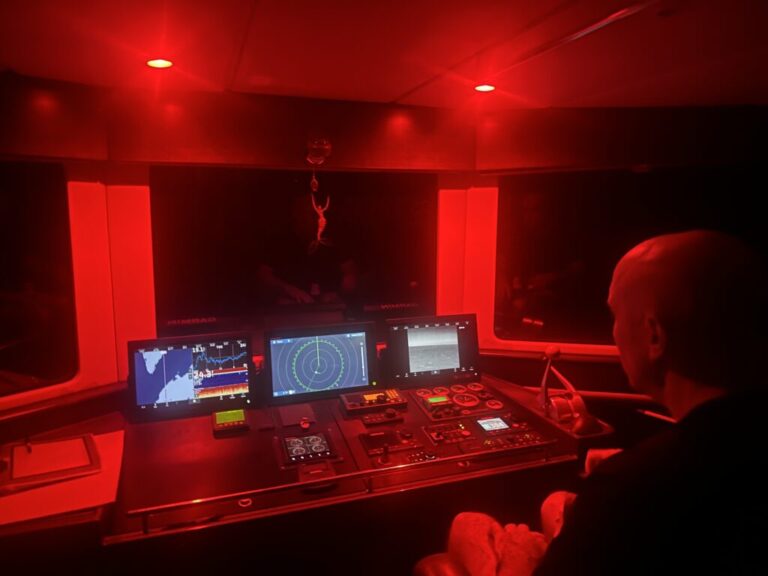The good ones build long-term relationships by balancing the interests of buyer and seller
Many yacht brokers will tell you they are middlemen, though that is much too humble a description. Good yacht brokers are tight-wire walkers, charged with doing a good job for both seller and buyer while balancing over an ethical abyss where one misstep could kill their reputations.

The good broker – the one who is in the business for a career, not as a weekend warrior – knows that those who love boating have never bought their last boat. When the current deal is done, the broker expects that at some later date there will be another commission to be made from both the seller and the buyer. So this broker is motivated to do the best possible job for both, even in tough times when others might be tempted to cut ethical corners to close a deal.
“We don’t sell to one person one time,” says Jim Hedges, director of Lone Star Yacht Sales, a large-yacht dealership and brokerage in Clear Lake Shores, Texas. “We do repeat business. We have long-term relationships.”
Hedges recently sold a 68-foot Azimut to a client he has guided through nine yacht sales now. “We’re in business for the long run,” he says.
There are two ways to find brokers who value your trust. As any seasoned skipper knows, you can seek out local knowledge. Prowl the docks and ask other boaters whom they have used. Look for boaters who have used a broker a couple of times and still have good things to say about him or her. That’s a pretty good recommendation. Talk to marine repair shops, boatyards or other locals in the industry. Or go to one of the brokers’ professional organizations.
The Yacht Brokers Association of America sets standards of ethics and business practices for its members and provides a list of member brokers, as do the Florida Yacht Brokers Association, California Yacht Brokers Association, Northwest Yacht Brokers Association, British Columbia Yacht Brokers Association, Ontario Yacht Brokers Association and Gulf Coast Yacht Brokers Association. All of these groups contributed to the creation of a certification program that educates brokers in the field and tests their knowledge, while holding them to a code of ethics. Violation of the code can result in termination of their professional membership and loss of their certification.

Brokers handle people’s money. They provide people information – about the market, about boats, about a particular boat. “We’re in the information business; we’re in the money business,” Hedges says.

The ethics code sets high standards in both of these areas. More than 500 brokers from across North America are certified, but there are 3,500 practicing brokers in Florida alone, and probably 5,000 or more in the United States, says Gary Smith, president of the Florida Yacht Brokers Association and co-president of Sarasota Yacht and Ship Services.
Some independent-minded brokers may be very good but aren’t joiners – they don’t like associations. But beware. “Typically, the guys that commit violations aren’t members of any organization,” Smith says. If you’re considering a non-affiliated broker, do your homework, vet candidates, seek out local knowledge.
Either way, consider using a broker who has experience with the type of boat you’re shopping for – one who knows both the boats and their market.
Once you think you have found a qualified broker, get to know him or her. Walk the dock with the broker and look around his office. Is the person busy (a good sign, though in this market few offices are breaking any records)? Is the broker working solely by cell phone because he can’t afford an office (a bad sign)? Does the person have the time to listen to you?
‘Move the fiberglass’
Brokers take a commission off the top once the boat has been sold. The industry standard is 10 percent, although for large yachts – some say more than $1 million – the fee may be negotiable. Hedges says his office charges a 10 percent commission on the first $10 million of a sale and 5 percent on the balance, though in the end commissions are determined by “mutual agreement.”
When the same broker lists the boat and finds a buyer for it, that broker gets the whole commission. But most boats are placed in a multiple listing service, the same as real estate. If another broker finds a buyer, the commission is split – often 50-50, but sometimes the selling broker gets 60 percent and the listing broker 40 percent, especially among bigger brokerage houses.
However, expect the rules to be a little different in this sluggish economy. “What tends to happen in this market if you’re charging a standard commission is that everybody chips in to make the deal happen,” says David Pugsley, YBAA president and vice president and general manager of Brewer Yacht Sales, headquartered in Westbrook, Conn. “We see that a lot more than we did in the past. You’ve just got to move the fiberglass.”
The way the commission is split between the listing broker and selling broker is important to both seller and buyer because it can affect how much exposure the seller’s boat gets and how willing buyers’ brokers will be to show the boat to their clients. If the listing broker demands a 50 percent split, buyers’ brokers may be less inclined to show that boat than one where they get 60 percent.
The frequency of split commissions has declined since the Internet made it easier to shop for a boat online, according to some brokers. Now a buyer is more likely to go directly to the listing broker. Some new-boat dealers also have brokerage departments that sell used boats. The customer should distinguish between a brokerage boat the dealer represents and one the dealership owns. In the latter case, the dealer may be more inclined to negotiate price.
If you’re selling
What should a seller expect from the broker? Perhaps the most critical decision a broker can help a seller with is setting a reasonable asking price for the boat. In this market especially, your pride and joy probably isn’t worth the platinum price tag you’d like to tie to her bow pulpit. Brokers have access to a multiple listing service and know the range of asking prices for the make, model and year of your boat. Indeed, anyone can do an Internet search and come up with a range, and your potential buyers probably have. Brokers also have access to information on the selling prices for boats like yours. A good broker will steer you toward an asking price that will attract buyers while giving you full value.
In today’s market, the large volume of repossessed boats for sale has driven down prices and made pricing brokerage boats difficult. Production boat prices are down “25 to 30 percent, even more,” says Pugsley. “With high-quality, well-built boats – really good stuff – this is not as much of an issue,” he says.
These boats have held their value better. Pricing becomes particularly thorny for a seller who bought his boat with 100 percent financing – or even 80 to 90 percent financing – has to sell now for whatever reason, and finds that the boat’s value in the current market is less than what he or she owes on it. “Sellers wind up coming to the closing table writing checks instead of receiving checks,” Pugsley says, although sometimes a mortgage holder will agree to forgive all or part of the difference between the selling price and the outstanding debt on the boat – what’s called a “short sale.”
The listing broker should inspect a seller’s boat and create a full specification sheet listing all of its features. He or she should also obtain a complete history of the boat from the seller, including where and how it was used, the number of previous owners, major repairs, sinkings, groundings, collisions and so on. The broker also should get quality photos of the boat. If the broker finds obvious problems, the seller can expect to be told of them. A good broker will advise you to let your asking price reflect the cost of repairing problems.
Armed with the specifications, the broker should advertise your boat in the appropriate marine publications and on the Internet. Hedges, who deals in high-end yachts, says he uses social media – Facebook and Twitter – to get the word out about his brokerage yachts, and he advertises globally. It’s a global marketplace.
On a practical level, a broker is there to show your boat so you don’t have to deal with the hassles. And the broker is in a position to screen prospective buyers so that only those who can realistically expect to buy your boat are given a walkthrough. The broker can provide you with a standard contract that covers all eventualities.
If you’re buying
What should the buyer expect from a broker? Whether you are dealing with the broker who listed a boat or have engaged a broker to help you search, you can expect first to be questioned about your wants and needs. Even if you think you know precisely what boat you want, the broker will do you a service by showing you a range of similar vessels. There may be boats you were unaware of that would come closer to your ideal. In a perfect world, the broker also will make sure the boats he or she presents to you are within your means, both financially and in terms of your ability to safely operate them.
One of the key things a broker can do for you, the buyer, is ensure that the seller lives up to the contract. Good brokers use a standard contract that provides, among other things, for an escrow account to hold your deposit. Under that contract, you should be afforded sufficient time to locate a surveyor to inspect the boat and arrange financing. During that time, your deposit is held by the broker in the escrow account and not mingled with his or her other funds.
Brokers, to the best of their ability, have a duty to protect the public against fraud, misrepresentation and unethical practices. That’s part of the Certified Professional Yacht Broker code of ethics. The study guide for the certification exam suggests that this duty includes full disclosure about the boat:
“A listing broker has the responsibility and an obligation to both a fellow broker and potential buyer to provide the most complete and accurate information on the listed vessel as possible, even if the information contains negatives,” the guide reads.
Smith, from the Florida brokers group, says the CPYB program’s rules about disclosure – as well as other issues – were written to be clearer and more defined. It is very clear to Smith that it is a responsibility to disclose anything a broker knows about a boat – anything “material,” major or minor – that a prospective buyer would want to know about, he says. “We’re trying to bring this industry into the 21st century. It’s ridiculous that someone would sell a boat that has sunk before and not tell a buyer that it sank,” he says. “We would never do that – and no reputable broker I know would. The new rules would mandate this disclosure.”
Pugsley agrees. “Absolutely. If there’s something we know, we will disclose that information,” he says. “We have to disclose it.”
A judge ruled in 2005 that MarineMax of Ohio had to pay a boat owner $1.9 million for failing to tell him the 51-foot Sea Ray he bought from the dealership had been badly damaged in a grounding, then inadequately repaired. The judge characterized the fraud – the withholding of material information – as “particularly gross and egregious” and said it “constituted a pattern of conduct that was designed to sell a vessel to an unsuspecting buyer, regardless of its defects.”
Pugsley, however, notes that a broker can’t tell a buyer what he doesn’t know. It is the responsibility of the seller to disclose to the broker any known problems with the boat. The long and short of it is you should expect an honest answer when you ask if there are any problems with the boat, but be sure to ask.
The sales contract should reference surveys, financing, sea trials and inventory exclusions. That way, if the surveyor should find grounds for backing out of the deal or if you cannot find financing in time, your deposit will be returned. It is the broker’s job to see that it is. And be sure to put a big enough deposit in escrow when you sign the purchase agreement so you can tap it – and reduce the purchase price – to correct any problems found in the survey or sea trial.
At the same time, it is the broker’s job to determine whether the boat is free of liens – another potential deal breaker. There are two dates the broker should make the buyer aware of: the acceptance date and the closing date. The acceptance date is the day specified in the contract by which the survey and financing must be completed and the buyer has to accept the contract. The closing date is the day the money is paid, and the deal is completed.
Your expectations
What shouldn’t a buyer expect? Don’t expect the listing broker to let you know the lowest possible price you might pay for a boat. The broker’s job is to get the best possible price for the seller. You can ask what counteroffer you should make, but expect the broker to suggest a figure that the seller will be comfortable with. If you try to lowball the seller, the broker will pass your offer along, but you may be told not to expect a response.
Don’t expect the broker to warranty the boat, or to recommend a specific surveyor, financing company or insurer. Brokers quite often will have a list of surveyors and brochures supplied by insurers and lenders. But if a broker strongly urges you to use a particular surveyor or other service, it may be time to reconsider your involvement with that broker.
Should you ever buy a boat without a broker? If you know the boat owner, know the boat and know the boat’s market value, you may well be happier dealing directly with the seller. Also, most brokers charge a minimum commission.
If that fee is $1,500 and the boat is worth $5,000, you’d probably be better off with a private sale. But beware: You may not really know the market as well as you think. There could be liens on the boat of which you are unaware, and they follow the boat. And if you place a deposit before a survey, you will have no guarantee the money will find its way back into your pocket.
Remember, the right broker – emphasis on right – can make boat buying more fun, and after all, we buy boats for pleasure. The broker can become an ally in the game of boat buying or, when a couple is shopping, a go-between.
“Ninety percent of the time, it’s the guy who wants to buy this boat, and he’s trying to convince his wife to spend disposable income on it,” says one industry observer. It will be the woman to whom the broker looks to make the sale “because she ultimately makes the decision whether the man can buy the boat.”
But a good broker – an honest broker – also can be a hedge against trouble. “One of the reasons you use a broker is that you wouldn’t know the steps to take to ensure you’re protected,” says Pugsley.
See related articles:
– Be on the lookout for these red flags
This article originally appeared in the March 2010 issue.










